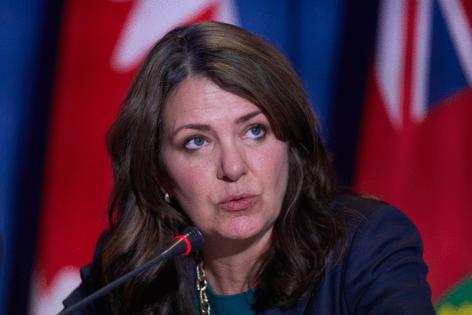Alberta's Smith plans talks with Carney, says separation vote possible
Published in News & Features
TORONTO — Alberta Premier Danielle Smith said she’s appointing a group to negotiate with the Canadian government on removing laws that restrict energy production, adding that a referendum on the province separating from Canada may be on the ballot as soon as next year.
Alberta will seek an agreement that guarantees energy transportation corridors to the Atlantic, Pacific and Arctic coasts so that the province’s resources can get to global markets, Smith said Monday. Her administration also wants the national government, led by Prime Minister Mark Carney, to repeal laws that regulate industrial carbon emissions and that require Canada to move to a net zero electricity grid over time.
“These laws are destroying investment confidence and cost, in Canada and Alberta, hundreds of billions in investments each year,” she said. “They need to go.”
Alberta is forced to send the vast majority of its oil exports to the U.S. because there’s only one crude pipeline that goes to an ocean port. But western Canadian gas producers are about to gain better access to Asian markets through new liquefied natural gas facilities on the coast of British Columbia.
Smith said her government will form a panel to discuss steps the province can take to protect itself from federal policies that damage its interests, with a goal of putting the group’s recommendations on the ballot in a provincial referendum next year.
Alberta won’t put forward its own referendum question on secession from Canada, according to Smith. However, her government has drafted legislation that, if passed, will make it possible for citizens to trigger a provincewide vote on separation, if at least 10% of eligible voters sign a petition asking for one.
Smith’s address to the province, delivered Monday, underscores the fractures within Canada after voters returned Carney’s Liberal Party to power last week, over the objections of the majority of Albertans who voted for the Conservative Party.
‘Lost hope’
Alberta has long fought with the federal government in Ottawa over measures affecting the province’s oil industry, and the conflict intensified when former Prime Minister Justin Trudeau limited pipeline development, introduced carbon taxes and set caps on oil and gas emissions. The historically conservative province’s frustration is flaring up yet again after Carney’s election triumph.
“There is a large and growing number of Albertans that have lost hope in Alberta having a free and prosperous future as a part of Canada,” Smith said.
Smith has made a priority of trying win Alberta more autonomy from Ottawa. Her government’s first piece of legislation after taking over in 2022 sought to prevent provincial and local agencies from following federal rules that the provincial government deemed harmful to the province.
She has also explored pulling Alberta out of the national pension plan, starting a government-run utility company to sidestep federal emissions rules, and creating a new provincial police force to supplant the Royal Canadian Mounted Police.
The national Conservative Party, which was endorsed by Smith, dominated in Alberta, winning about 65% of the popular vote and 34 of the province’s 37 seats in last week’s election.
Smith and Carney spoke shortly after he became prime minister in March and she released a list of nine demands — including canceling the oil and gas emissions cap and repealing a bill that the industry has said makes pipelines harder to build. Those issues must be addressed in the first six months of the next prime minister’s term to avoid “an unprecedented national unity crisis,” she said at the time.
The two spoke again last week after the election, and she described the meeting as positive, saying that the two found some common ground.
It’s not the first time the idea of separation has been tossed around in Alberta. A small but vocal secessionist movement flared up after Trudeau’s reelection in 2019 but quickly faded, and no referendum on secession ever made it to a vote.
The province of Quebec has twice held votes on separating from Canada — once in 1980 and again in 1995 — with voters rejecting the option each time.
_____
©2025 Bloomberg L.P. Visit bloomberg.com. Distributed by Tribune Content Agency, LLC.







Comments